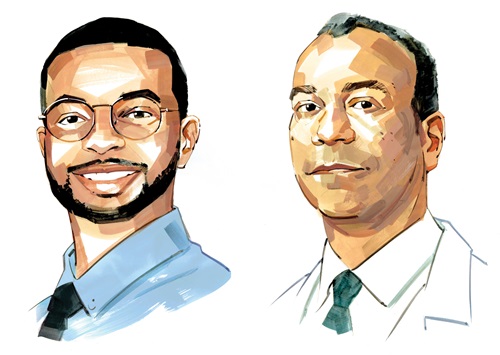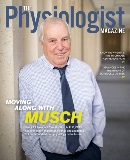“Striking a balance between research productivity and personal well-being is crucial. The pressure to publish should not come at the cost of the physical and mental health of researchers.”
I’ve Earned My PhD. Now What?
How to successfully transition from graduate student to postdoc.
 Each issue, we
ask a student or early-career member to pose their career questions to an established investigator and mentor. Here, Rashaun Williams, a PhD student at the University of Wisconsin-Madison, asks Robert S. Hoover, MD, questions about preparing for life
after earning his advanced degree. Hoover is professor of medicine and physiology, The Dr. A. Rudolph and Ruth Ryder Huberwald Chair, and chief of section of nephrology and hypertension in the Deming Department of Medicine at Tulane University School
of Medicine in New Orleans.
Each issue, we
ask a student or early-career member to pose their career questions to an established investigator and mentor. Here, Rashaun Williams, a PhD student at the University of Wisconsin-Madison, asks Robert S. Hoover, MD, questions about preparing for life
after earning his advanced degree. Hoover is professor of medicine and physiology, The Dr. A. Rudolph and Ruth Ryder Huberwald Chair, and chief of section of nephrology and hypertension in the Deming Department of Medicine at Tulane University School
of Medicine in New Orleans.
Q: There is a current trend away from academia and postdocs after completing a PhD and a move toward alternative career paths. Why do you think that is, and how can we change that trajectory?
A: There are many
reasons for this trend. I believe one of the primary reasons for this is concern about securing consistent federal funding in this difficult funding environment. The pressure at many research-intensive institutions to maintain two R01-level grants
to achieve tenure is an extremely difficult bar to surpass. I believe this has led to many seeking alternative pathways. One thing we can do to relieve some of the perceived pressure is to emphasize that there are many institutions where the funding
bar is not quite as high. Additionally, academic institutions should work toward creating more realistic expectations for tenure. Rethinking the heavy reliance on R01 grants and considering alternative metrics for tenure evaluation could be ways to
reshape this process to make it more appealing to young investigators.
Q: What is your opinion on the adage “publish or perish” for graduate students and postdocs?
A: Our work is only available for evaluation if it is published. Publications are our currency. So we
must publish, but where there is room for flexibility is how and where we publish. As has been the case for many years, there is an overemphasis on impact factor. I believe we need to continue to try to focus on publishing good science in journals
that have a fair and rigorous review process. Additionally, striking a balance between research productivity and personal well-being is crucial. The pressure to publish should not come at the cost of the physical and mental health of researchers.
The “publish or perish” culture can be improved by fostering a more balanced and multi-faceted approach to evaluating research contributions.
“A large part of the promotion process in academia is related to establishing that you are a national and/or international expert in your field. This is demonstrated not only by publications and grants but also by national service and presentations at national meetings. Serving in roles for organizations like APS is important.”
Q: What is the biggest transition between a graduate student and postdoc, and what advice do you have?
A: I believe the biggest transition from graduate student to postdoc is becoming more independent as you
move closer to your faculty or industry career. I always tried to foster a sense that the project is the postdoc’s project, not the mentor’s project. Also, a great postdoc-principal investigator relationship should entail the postdoc contributing
new ideas that can lead to a line of research that can develop into an independent project that allows separation from the mentor. This development and nurturing of independent and novel ideas is a critical part of becoming a postdoc. Depending on
the type of postdoc, this can also be the first time managing a budget (training grants and F32 fellowships provide small budgets), which is an important, but underemphasized, skill.
Q: What would you advise trainees do to advance themselves professionally away from the bench?
A: The most important thing to do is to take care of your mental health. Whether this be through hobbies, working out,
meditation or other means, being mentally healthy is critical to putting yourself in a position to excel.
As far as advancing your career, it is critical to network. You should volunteer in organizations that are consistent with your scientific interests. This is important not only to support organizations such as APS but also to establish your reputation. A large part of the promotion process in academia is related to establishing that you are a national and/or international expert in your field. This is demonstrated not only by publications and grants but also by national service and presentations at national meetings. Serving in roles for organizations like APS is important.
I also encourage my postdocs to attend social events such as receptions and dinners. This is where connections are made that may lead to appointments on committees, presentations at conferences and collaborations. Relationship building is an essential
part of any academic career.
Got a career question you'd like to submit? Email it to tphysmag@physiology.org. We may use it in an upcoming Mentoring Q&A.
The Physiologist Magazine
Read the Latest Issue
Don’t miss out on the latest topics in science and research.
View the Issue Archive
Catch up on all the issues of The Physiologist Magazine.
Contact Us
For questions, comments or to share your story ideas, email us or call 301.634.7314.


